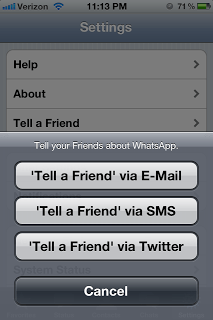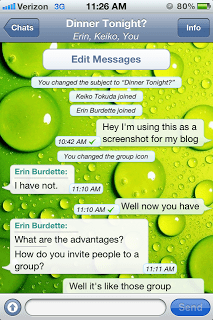If you’ve ever owned a Blackberry and LOVED Blackberry Messenger (BBM), it’s basically the same exact thing – but instead of being closed to JUST BlackBerry owners (R.I.P. RIM) it works across all mobile platforms (so if you have iPhone you can message someone with an Android phone or vice versa). If you’ve never owned a Blackberry, think of it as a chat/IM service – but one that doesn’t require you to proactively log in or be “online.”
The major difference between WhatsApp and traditional texting is that instead of being billed on a per message basis or requiring you pay for a bundle of text messages, WhatsApp uses your cellular data or WiFi. While this does require you to have a data package on your cell phone plan if you want to be able to use WhatsApp away from a location that has WiFi, most carriers now require you to add a data package to your plan when you purchase a smartphone anyways. In other words, if you get email and internet on your phone you already have this feature. The other good news is that the amount of cellular data that WhatsApp uses is so small, that you can literally send hundreds of messages and never hit your data limit. And if you ARE worried about hitting your data limit, WhatsApp provides a helpful Data Usage counter so you can easily track all of this. I know the terms kilobytes (KB)/megabytes(MB)/gigabytes(GB) sound terrifyingly complicated, but I assure you I am extremely “math challenged” and end up using a conversion calculator like the one found here when my brain wants to explode from trying to comprehend what this nonsense means. Most cell phone companies also allow you to check your data usage via customer service, their website or right from your phone, so you honestly shouldn’t be too worried about this as long as you have a general idea how much data you’re using.
- Easy set-up –all you need is a phone # – no need to create and remember a username/password. After the initial set-up you can use WhatsApp over WiFi.
- Favorites List – once you install WhatsApp, you can have the app scan through your phone’s contact list and it will recognize anyone that has WhatsApp downloaded on their phone. This prevents you from having to “find” your friends that are also using the app, and gives you a nice base of people to chat with right off the bat. You can then add your BFFs to a “Favorites List” to easily view their statuses and initiate a conversation.
- Invite your Friends – to chat with your friends they need the app on their phone as well – but it’s really easy to invite people directly from inside the app.
- Group Chat –pretty self-explanatory – think old-school AOL chat room or GChat group chat. Very helpful for coordinating dinners or other group activities, and sending photos to multiple people at the same time. This is similar to group SMS on your phone, but it has a much cleaner, more organized look. Find it located under “Chats” → “New Group”, and you can add up to 10 people.
- Send Media to Friends – Whatsapp makes it really easy to send media to friends and family. You can send photos, contacts, a little map of your location and even cheesy “audio notes” if you want to add a personal touch to your message. As an aside, one fun way I’ve used the audio note feature is to play a “Name That Song” game. I’ve captured a short audio recording of a song by holding my phone up to a speaker, sent it to a friend and then had them try to guess the name of the song. Nerd alert, I know – but most of my friends live in different states. And you’d be surprised how entertaining this can be on a boring cross-country roadtrip.
- International Texting – sending and receiving texts when you or a friend are in a different country will typically cost anywhere from $0.10 – $0.50 per message (sometimes even more!). If you have an international data package, a pay-as-you-go SIM card or plentiful WiFi access, you no longer have to worry about being hit with these absurd fees and can still text freely with someone no matter where either of you are located.
- Other Fun Features – upload a customized background for your chat screen, add a personalized profile picture and status message and download Emoji (for Android here) for access to hundreds of awesome/ridiculous emoticons.













1)Whatsapp had a posting that indicated it was free for the first year. What is the charge after the first year? 2)Verizon has eliminated their $20./mo data package. So, if a family is not surpassing their minimum cost data pkg, probably Whatsapp is not an advantage…?
Bella – thanks for reading our blog! 1) So in terms of the actual cost of the app download, Whatsapp is free on Android for the first year, and then will cost you $0.99/yr. That's just to download the app though – there are no charges to actually USE the app once you pay the price of the app and download it to your phone. I believe when I first purchased Whatsapp for iPhone it was $1.99/yr, but it appears they have since lowered the price to $0.99/yr (matching the Android price) and they have sometimes run specials where they've given you a free year.To recap:Android: Free for first year – $0.99/yr thereafteriPhone: No free first year (although sometimes they run special promos) – $0.99/yrWindows Mobile: Free for first year – $0.99/yr thereafterBlackBerry: Free for first year – $0.99/yr thereafter2) I have recently been looking into the Verizon Shared Family Data packages for my family – and while this is probably a topic for a separate blog post but I'll attempt to address your question. There are two issues to address in relation to Whatsapp though – data and texting. In terms of texting, there is and always has been an option to have unlimited texting on your Verizon plan but it costs an extra $20/month and is severely overpriced (as mentioned in our post). There is still the option to have this on the new Family Shared plan but you will pay for it. If you do have this option than one could argue that Whatsapp really isn't an advantage because you will never "go over" your text limit – but you're still paying a lot of money to have that luxury, and your friends may not be paying for that option and therefore prefer that you "text" them on a service like Whatsapp. If you travel internationally, Whatsapp also provides an advantage, as outlined above.In terms of data, this is where things get a bit more complex. As more and more people get smartphones and consume more and more wireless data, Verizon is trying to move everyone off of "Unlimited Data" plans that they used to offer and onto a shared pool of data. They offer options of 2GB, 4GB, 6GB…all the way up to 10GB – each with a different cost. You will share that among however many phones are on your cell phone plan. Whatsapp uses such a small amount of data though, that you don't really need to worry about the app consuming a large portion of your data, no matter what the total amount you're sharing is.In summary, the Whatsapp advantage really has more to do with the fact that it eliminates the need for you to pay for a pricey texting package – and less to do with affecting how much data you or your family is using. I hope this helps – please feel free to follow up again if you need more clarification or have any other questions!
Another place I read says that verizon will charge you for photos you send via whatsapp. Is that true?
Suz, as long as you don’t exceed your data limit you will not get charged for photos sent via WhatsApp. I have Verizon and use WhatsApp regularly, and have never been charged for sending a photo – even when traveling internationally. Here’s a blog post straight from WhatsApp’s FAQs that echoes this as well (https://www.whatsapp.com/faq/en/general/20965922). Thanks for the question!